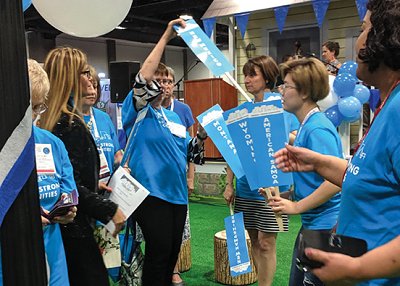 |
| ALA staffers and ALA president Loida Garcia-Febo (in black) hand out signs and prepare
for a rally in the exhibit hall. |
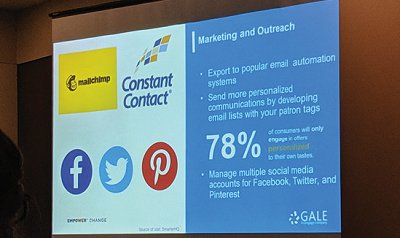 |
| Part of the presentation on the features of the forthcoming Gale Engage tool |
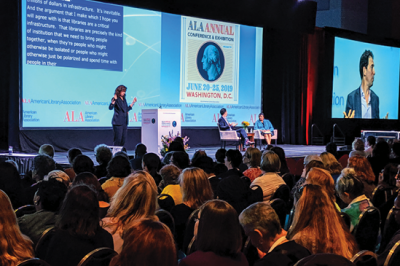 |
| A sign language interpreter (left) and live, on-screen transcription help share the discussion between author Eric Klinenberg and Librarian of Congress Carla Hayden. |
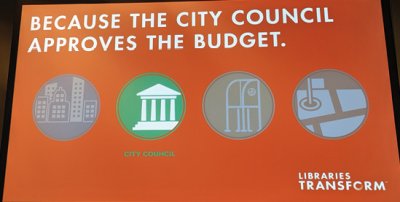 |
| This slide demonstrates how Cedar Rapids Public Library incorporated ALA’s Libraries
Transform campaign into its local work and its presentation. |
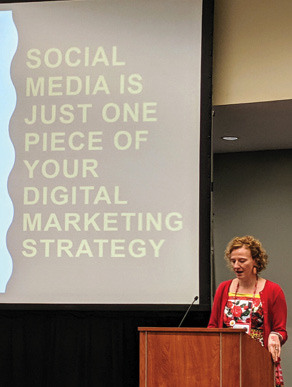 |
| ALA’s Stephanie Hlywak discussed social
media and other online marketing. |
From June 20 through 25, ALA convened its annual conference; the 2019 site was Washington, D.C. Just a short ride on Amtrak enabled me to cover the event for the 22nd or 23rd time. While some things remain the same, each year also holds something new.
President’s Tour Makes Its Final Stop
My first new experience this year was being part of the final stop of the international tour that ALA president Loida Garcia-Febo has been on during her year at the helm (www.ala.org/news/state-americas-libraries-report-2019/libraries-strong-communities). The travel, part of her presidential initiative Libraries = Strong Communities, was launched in support of ALA’s Strategic Directions, which are Advocacy, Information Policy, Professional & Leadership Development, and Equity, Diversity & Inclusion.
As ALA summarized in a May 30 press release, “Garcia-Febo traveled more than 200,000 miles and visited a variety of libraries in eight countries. She met with local advocates, library leaders, and city government officials to discuss how libraries strengthen communities through education and lifelong learning. More than 200 media organizations provided coverage of Libraries = Strong Communities and reached more than 56 million potential advocates in communities across the [U.S.]”
The tour concluded with a rally in the ALA exhibit hall during which attendees held signs to represent their states. Garcia-Febo spoke about her advocacy efforts and encouraged the crowd to shout out loud for libraries, both at that moment and into the future. (In addition, she’d made another advocacy move at the prior evening’s opening general session. Garcia-Febo asked attendees to use their phones to text a #FundLibraries message to a pre-arranged number that would reach senators. ALA reported that, in under 5 minutes, 4,000 messages went to senators, and more were sent throughout the conference.)
Gale’s New Product to Enable Marketing
A major marketing product is scheduled to be released this fall, and I saw a demo during a small luncheon hosted by Gale, a Cengage company. The software is called Gale Engage, and Gale representatives said it was conceived after asking librarians what they want. Three top responses were a way to better understand patrons, a tool for marketing and outreach, and a way to see various key performance indicators (KPIs) in one place.
Here’s how the collateral material describes the resulting product: “Gale Engage is a cloud-based solution that centralizes public library data and offers the means for faster decision making, more efficient marketing and outreach, and helps libraries prove their value to the community.”
During the luncheon presentation, Gale’s David Ziembiec showed slides with dummy data, displaying screens of the customizable dashboard where clients will be able find stats, KPIs, usage and attendance numbers, etc.
During their discussions, librarians told Gale employees that they generally send the same email messages to everyone. Of course, savvy marketers know customization is vital. But requests to send targeted emails often raise privacy concerns from library administrators. So Ziembiec and other Gale representatives discussed privacy protections in detail. They explained how the Gale Engage system applies tags to library card records according to usage in order to segment patrons who borrow the same categories of resources or attend the same sorts of programs over a given time period. (Tags can also be removed for inactivity at time frames a library specifies.) So when a marketer wants to email everyone who cares for toddlers, for example, he or she can call up the tags for “toddler books” or “toddler storytime” and blast an email to all users who have had those tags linked to their records by the automated system. (Caregivers would need to scan their library cards on the way into a storytime.) This way, librarians don’t see the individual users.
When you’re marketing to people, a Gale employee stressed, “it doesn’t really matter who they are; it matters what they like.” He added that Gale Engage has been designed to comply with the strictest privacy laws and that the data gathered stays in-house and is not sent to Gale.
After the demo, I spoke with Lisa Cruz Novohatski, one of Gale’s marketing and analytics consultants who’s developing Gale Engage. She confirmed for me that, as full-featured as Gale Engage is, it is not an ILS. Rather, it uses ILS data, among other datasets, so potential clients won’t have to change their management systems, and it will unify siloed data for a comprehensive view of library engagement. The platform is data-agnostic, Novohatski explained, and can ingest any structured data source.
Gale Engage will include the ability to schedule messages to social media accounts, to identify the most engaged users, to crunch numbers, and to work seamlessly with the email platforms that librarians already use.
What I Heard in Sessions
I attended numerous educational sessions; one had an especially interesting trio of panelists: Amber McNamara, community relations manager, and Dara Schmidt, director, both from Cedar Rapids Public Library in Iowa, presented with a unique partner—Jeff Pomeranz, the Cedar Rapids city manager. In their talk, How Everyday Relationships Build Support and Help Libraries Transform, they explained how they came to work together. After the library lost a 2016 ballot initiative and was forced to reduce hours and services, its leaders decided that, rather than face another public vote, they would shift their strategy to aligning and partnering with city stakeholders.
As the librarians and city administrators began building relationships, Schmidt began attending city meetings. They worked on some initiatives together. Cedar Rapids Public Library hosted forums during a mayoral race and showed off Libraries Transform materials inside and outside the building to raise awareness in non-users who attended the election events.
One key to success, they all agreed, was giving everyone ownership of city business. Pomeranz came to understand and believe that “the library is critical to the community.” Eventually, Cedar Rapids Public Library had $100,000 added to its budget and was able to restore the hours it had cut earlier.
Late Saturday afternoon, I (and thousands of others) attended a major session in which Librarian of Congress Carla Hayden sat down with Eric Klinenberg for a discussion about the state of democracy, based largely on his popular book, Palaces for the People. Klinenberg, a social scientist, led a team that was trying to design “resilience centers” after Superstorm Sandy demonstrated how much American cities needed places for people to come together in times of crisis. They came to realize that we already had organizations that did just about everything the team was thinking about—public libraries were the best “social infrastructure” sites.
Speaking about the network of public libraries already in place around the country, Klinenberg stated, “We’ve overlooked it, to our detriment.” He added that people in “the elite sectors” don’t understand the vital role libraries play. There’s been an awakening, he said, but we need more. And he acknowledged that librarians’ jobs keep getting harder as municipalities continue to cut library budgets as well as funding for other social organizations and safety nets.
The hour-long discussion produced a flurry of quotes that drew applause. My favorite from Klinenberg was, “Libraries are critical social infrastructure.” Hayden quipped, “I feel a T-shirt coming on,” and the pair exchanged phrases such as “radical inclusiveness @ your library.” The session was like a giant affirmation for the audience.
Sunday’s Public Relations Trifecta
The big day for marketing and public relations events is Sunday. I was grateful to have a table at the PR Xchange where I could give out sample copies of MLS, talk shop, and see all of the collateral materials that librarians across North America generously shared with their peers. The crowd seemed smaller this year, but was no less enthusiastic.
Winners of the PR Xchange Awards gathered in the same exhibit hall space for the co-located ceremony. As I covered in the News section of the July/August issue of MLS, a full slideshow of the winners is at http://bit.ly/2019-PRXchangeAwards.
The second Sunday event was the PR Forum, which usually features an ALA staffer and an invited speaker. This year, ALA’s director of communications and marketing, Stephanie Hlywak, gave a short talk on social media best practices. While many think of social promotion as being free, Hlywak listed its real costs, namely staff time for maintaining the accounts to keep them fresh, relevant, and effective. I laughed when Hlywak likened Facebook’s constantly changing algorithms to Mark Zuckerberg “raising your rent” (by requiring more time). Social media companies’ many adjustments do make it necessary to watch accounts closely.
This year’s featured speaker was Linnea Hegarty, director of strategic partnerships and development at the DC Public Library, who talked about her library’s “#UncensoredDC” celebration of banned books.
The third event of the PR trifecta was the biggest—the John Cotton Dana (JCD) Library Public Relations Awards ceremony. As many MLS readers know, the H.W. Wilson Foundation provides $10,000 in prize money for each of eight JCD winners. EBSCO Information Services hosts the awards reception, and LLAMA oversees the contest itself.
JCD committee chair Patrick Zinn said 69 library campaigns were entered this year, and the judging came down to 12 that were “neck and neck.” While choosing the eight winners, he revealed, “It got down to minutia.”
It’s always heartwarming and enlightening to hear the winners take their turns at the podium and say a few words about why their campaigns mattered so much and how they worked. Heidi Daniel, CEO of Enoch Pratt Free Library, which won for a campaign telling residents it had gone fine-free, explained how staffers had mapped the cardholders that had been blocked for fines and realized they were “taxing over-taxed neighborhoods.” Eliminating fines would only reduce the budget by less than one-quarter of 1 percent, she said, so Pratt took the plunge.
One of the winners from Spokane Public Library said of her work, “Every day I feel like we’re impacting our community.” Another, from Vancouver Public Library, voiced, “We all, in libraries, spend too much time being modest,” and stressed that we need to be more proud, and loud, about our good works.
In closing, before the crowd got back to the ceremony’s lovely snacks and drinks, Zinn said that seeing these amazing campaigns “keeps me inspired as a marketer.” As I covered in the July/August issue, you can read about the 2019 winners at http://bit.ly/JCDawards2019.
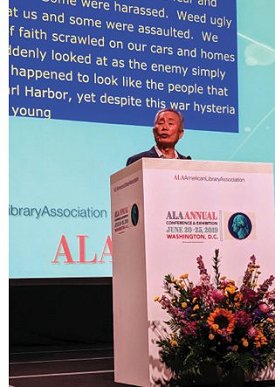 George Takei Discusses His First Graphic Novel, They Called Us Enemy George Takei Discusses His First Graphic Novel, They Called Us Enemy
I closed out my ALA experience with another first for me—seeing star of stage, screen, and social, the one and only George Takei. He crossed the stage to a standing ovation from a crowd of thousands on Monday morning. His appearance was sponsored by Top Shelf Productions/IDW Publishing, which released Takei’s first “graphic memoir,” titled They Called Us Enemy, in July.
I’d thought this outspoken advocate (for LGBT+ rights, social justice, and human rights) might get political, but the closest he got in his opening remarks was saying, “Today, we live in fraught times.” Instead, Takei spoke of his family’s experience with the Japanese American internment camps of the early 1940s. He relived the horror of having soldiers with rifles and bayonets order his family out of their home at gunpoint and related how awful the camp was. The star also explained that, years later when he was a voracious teen reader, he found nothing written about the camp he’d been held in during this embarrassing episode of American history.
Soon, he invited three others on stage: the graphic novelists and graphic artist who helped him create his illustrated memoir. That discussion filled most of his presentation time.
The single librarian-applause line I heard Takei utter before I had to leave was that he sees librarians as the keepers of written words and history, and he’s grateful for their help in spreading his story.
To me, this is one more piece of evidence about how important it is that librarians curate, protect, and share the stories of our world. |